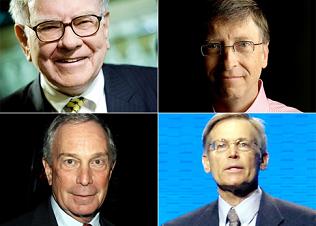The Richest People in America
The Forbes 400 List: 2010

Picture: Warren Buffett, Bill Gates, Micheal Bloomberg, Lawrence Ellison
While 2010 has seen the vast majority of the US population suffer the consequences of the worst economic crisis since the Great Depression—mass joblessness, wage cutting, plummeting home prices, record foreclosures, and spending cuts by near-bankrupt states and cities—for the handful of plutocrats who control the nation’s wealth it has been a very good year indeed.
According to Forbes magazine, the net worth of the 400 richest Americans increased by 8 percent in 2010, to $1.37 trillion, in the year ending August 25. The figure is slightly greater than the entire gross domestic product of India, population 1.2 billion. It is also more than 10 times greater than the $121 billion combined budget deficit of all 50 states for 2011.
The household wealth for the great majority is going in the opposite direction. Last week, the Federal Reserve revealed that the net worth of all US households and non-profits fell 2.8 percent in the second quarter, to $53.5 trillion. This means that the richest 400 Americans have about 2.6 percent of the total national household wealth, the other 310 million splitting the remainder.
Though most Americans have experienced nothing of the “recovery” touted by the Obama administration, the extremely rich know different. The wealth level to gain admittance to the Forbes 400 club rose this year back to $1 billion—after falling last year to $950 million as the super-rich suffered, in their own particular way, the effects of the financial collapse of 2008.
Year-to-year changes aside, the 2010 list registers a longer-term accumulation of wealth that has been underway for three decades. When Forbes first published the Fortune 400 list in 1982, there were “only” 12 billionaires in the US, and the richest American, shipbuilding tycoon Daniel Ludwig, had net wealth estimated at $2 billion. Adjusting for inflation, Ludwig would wind up 58th on today’s list.
The richest individual in America for the 17th year in a row is Microsoft founder Bill Gates, with a personal fortune estimated at $54 billion ($24 billion in 1982 dollars, 12 times the value of Ludwig’s empire that year). Gates’s net worth is equivalent to the GDP of Sudan, population 42 million, and is about $7 billion more than the amount earmarked by the US government for the Education Department in the 2010 budget.
Gates is followed once again by Warren Buffett, net worth $45 billion. Buffett has made the list every year since 1982, when he had estimated resources of about $250 million. The intervening years have been good for the Omaha investment tycoon, his wealth increasing by a factor of 180.
As in other recent editions of the Forbes list, the virtual absence of billionaires whose fortunes are derived from manufacturing is striking. One exception is 85-year-old William Ford, Sr., whose net worth of $1 billion brought him back on the list for the first time in several years. Ford’s wealth increased largely as a result of wage-cutting at his eponymous motor company.
The list offers a glimpse at the socially malignant character of today’s ruling elite and its activities. The great majority of the Forbes 400 have derived their staggering fortunes through one or another type of financial operation, such as hedge funds, private equity firms, real estate, “technology” (mainly through bubble-driven Internet or software ventures), and retail empires.
To be sure, America has always had its “robber barons,” long associated with names like Vanderbilt, Carnegie and Rockefeller. Though they brutally oppressed their workers, their wealth was derived from the building up of enormous industrial empires. Today’s robber barons have instead made their fortunes from the destruction of industry and out-and-out financial swindling unconnected to any productive economic process.
The increased wealth of the Forbes 400 is further evidence that the social crisis—far from giving rise to redistributive or even vaguely reformist policies to alleviate the suffering of the great majority—is being used to further enrich the fabulously wealthy.

